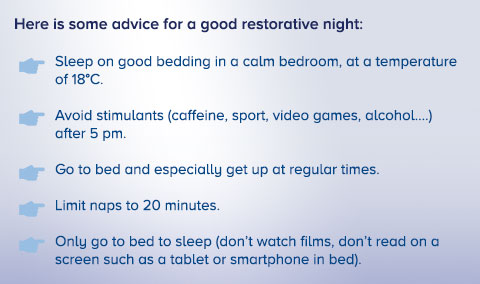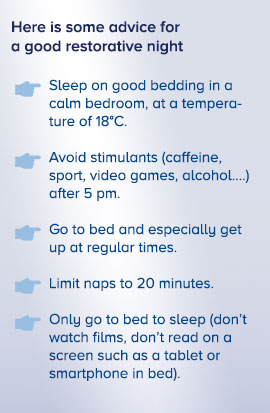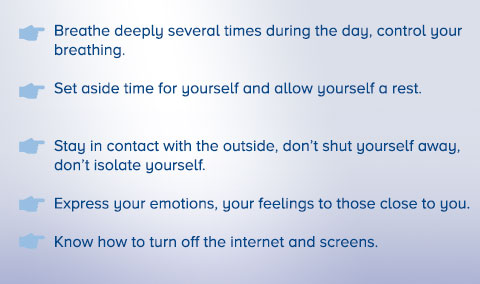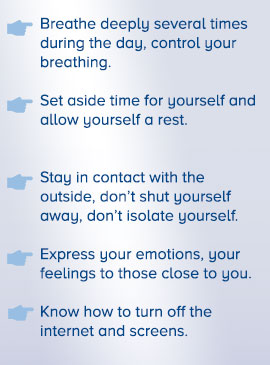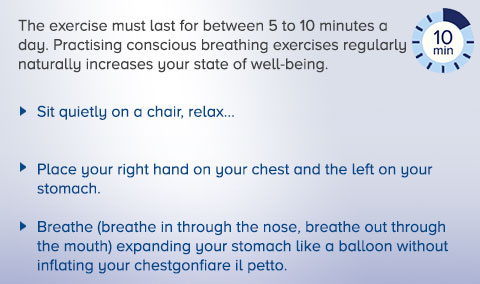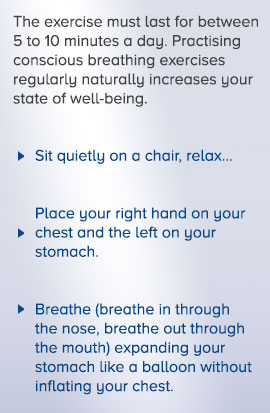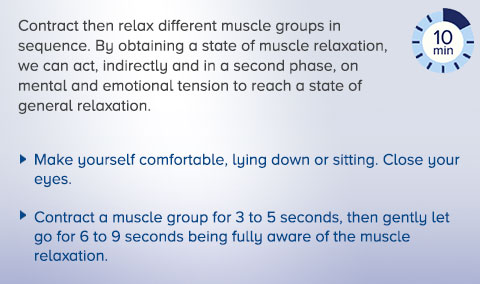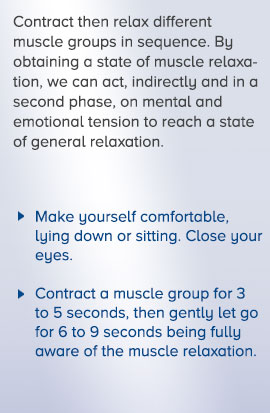
Because stress can become too invasive, here is some simple advice to help you manage it in your everyday life! A healthy lifestyle is essential to better cope with stress: a balanced diet, regular moderately intensive physical activity, enough sleep and some relaxation exercises while having fun! It is recommended that a healthy lifestyle and a regular life routine be adopted as habits are reassuring!
Practice a pleasant physical activity regularly
Physical activity really helps to reduce the signs of stress and anxiety.
- Exercise at least once a week, even once a day.
- Choose a moderately intensive activity such as swimming, hiking, calisthenics...
- Do not engage in sport in the hours before bedtime so as not to disrupt sleep.

Have a restorative sleep
In individuals who are sensitive to stress, daily life can be disrupted, beginning with sleep. A poor quality night causes possible fatigue and palpable irritation. You will say you are “edgy".
Here is some advice for a good restorative night:
- Sleep on good bedding in a calm bedroom, at a temperature of 18°C.
- Avoid stimulants (caffeine, sport, video games, alcohol...) after 5 pm.
- Go to bed and especially get up at regular times.
- Limit naps to 20 minutes.
- Only go to bed to sleep (don’t watch films, don’t read on a screen such as a tablet or smartphone in bed).
Learn to relax and remain calm!
The use of relaxation techniques is very useful in moments of stress to reduce physical and mental tension: breathing, yoga, sophrology:
- Breathe deeply several times during the day, control your breathing.
- Set aside time for yourself and allow yourself a rest.
- Stay in contact with the outside, don’t shut yourself away, don’t isolate yourself. Express your emotions, your feelings to those close to you.
- Know how to turn off the internet and screens.
Have a balanced diet
Diet provides the nutrients necessary for the synthesis of the neurotransmitters involved in nervous system balance, in particular noradrenaline and dopamine. Ensure that the following elements are consumed in sufficient quantity, through a varied, balanced diet.
- TO BE CONSUMED
- Group B Vitamins.
Whole grains, legumes, fish, meat - Vitamin C
Fresh fruits and vegetables - Omega-3 fatty acids
Oily fish, rapeseed oil - Slow sugars
Pasta, starchy foods
The organism needs energy to face up to stress. This energy is provided by slow sugars. - Antioxidants
Fruits, vegetables, spices, green tea, dark chocolate - Magnesium
Some mineral waters, dried fruits, grains, chocolate
Needs are proportional to stress. This mineral element is necessary to the maintenance of nervous system balance, and it also helps to reduce fatigue. It is released each time adrenaline is released and excreted in the urine.
- TO BE AVOIDED
- Stimulants
Caffeine, sodas, some types of tea, energy drinks - Sugar
Pastries, flavoured yoghurt, sodas - Refined carbohydrates
Sweets, confectionery, canned fruits - Bad fats
Fats contained in red meat
(mutton, beef and pork) or cheeses with a high fat content (mouton, bœuf et porc) ou les fromages à teneur en graisse élevée - Alcohol, tobacco.
Breathing and relaxation exercises
Abdominal breathing exercises - 10 min
Abdominal breathing contributes naturally to rest and relaxation. The benefit it provides is explained physically by the movements of contraction and relaxation of the diaphragm muscles. Speaking metaphysically, your energy field is harmonised, balanced and intensified.
The exercise must last for between 5 to 10 minutes a day. Practising conscious breathing exercises regularly naturally increases your state of well-being.
- Sit quietly on a chair, relax...
- Place your right hand on your chest and the left on your stomach.
- Breathe (breathe in through the nose, breathe out through the mouth) expanding your stomach like a balloon without inflating your chest.
Muscle relaxation exercise - 10 min
This exercise is based on alternating between contraction and relaxation of muscles. It starts from the premise that there is a relationship between the emotional state and muscle tension: the tenser we are, the less relaxed we are.
Contract then relax different muscle groups in sequence. By obtaining a state of muscle relaxation, we can act, indirectly and in a second phase, on mental and emotional tension to reach a state of general relaxation.
- Make yourself comfortable, lying down or sitting. Close your eyes.
- Contract a muscle group for 3 to 5 seconds, then gently let go for 6 to 9 seconds being fully aware of the muscle relaxation.
The idea is to change the muscle group in the course of the exercise: the right hand then the left, the right arm then the left, the face, the neck, the shoulders, the chest and the abdomen, the buttocks, the feet and the legs.
Other relaxation methods
There are several other relaxation techniques including:
- Hypnosis, a method of deep relaxation consisting in gradually disconnecting from the external world just through contact with the therapist, who uses suggestion to help you to find solutions.
- Sophrology, a relaxation technique based on breathing exercises and thought control, which aims at better awareness of the body and the messages it sends.
- Yoga, which combines relaxation and meditation being based on respiratory, muscular and articular effort.
